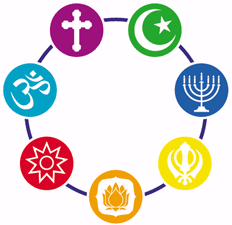
Southampton Council of Faiths - Christianity
What is a Christian?
A Christian is a person who follows Jesus Christ. Christians are not distinguishable by dress but should be identifiable by their demeanour of humility and grace. In the United Kingdom it used to be assumed that to be British was to be Christian. A group of Christians at worship is called a congregation.
There are two types of Christian in the United Kingdom; the Christian who positively tries to follow in the way of Jesus and the Christian who has a vague idea what it means and whose way of life is subconsciously infused with Christian culture and values.
Practicing, church-going, praying Christians see their religion as involving belief about God showing himself in Jesus, they belong to a community of other Christians, and strive to follow the examples of Jesus Christ.
What does a Christian believe?
Christians believe that there is one God who creates all things, and God continues to be involved in life. The world was created perfect but humanity has turned from God. Through the life, death and resurrection of Jesus, God's Son, God has given human beings a way back to him. God's Son, Jesus Christ, was born two thousand years ago and was fully human, living in a Jewish family. He worked miracles and taught that his followers (not then called Christians) should love God the creator and love their fellow human beings, including those whom they regarded as enemies.
Jesus criticised those in power and was arrested, tortured, tried and convicted. He was crucified. His followers dispersed, but regathered to celebrate his resurrection from the dead.
They experienced a surge of power which inspired them to teach and heal, proclaiming that the Kingdom of God had come; they also began to worship Jesus re-enacting the meal he shared with them.
Jesus re-established a loving relationship between humanity and God, by the gift of the Holy Spirit. This belief produces the doctrine of the Holy Trinity, Creator, Redeemer, Enabler; three persons in one God.
How do Christians worship?
All Christians should consciously spend time alone with God each day. This is called prayer. Some Christians meditate on Christian Scripture, called the Bible, a library of books defined by the Church as the divine scriptures of the faith, including the scriptures of the Jewish faith, the written life of Jesus and teachings of the early Christians.
For many Christians the heart of worship is the Eucharist or Thanksgiving. This is the re-enactment of the last meal Jesus took with his friends on the night before his death.
Christians sing hymns, pray collectively and study scripture together as a part of their worship. They gather together in churches or chapels to worship.
Christians are divided into different traditions, called denominations.
How does a Christian live?
Christians live by the Word of God. Christians are commanded to live frugally and not set store by possessions. They are commanded to care for those in need and to share what they have. Many Christians give at least ten percent of their income to charity (tithing).
Christians live joyfully knowing that this life is only a prelude to a heavenly life when they will be rewarded for their service to God and their neighbour; the daily practice of love which prepares them for eternal life in Gods presence.
Christians should not fear death and while grieving for their own loss when someone they love dies, they believe that the dead are with God and seek to celebrate lives lived in obedience to Gods will.
Who leads Christians?
Priests or ministers lead Christian communities. All Christians are ministers of the gospel. Some are called to leadership and are ordained as priests who have special roles including teacher, pastor, healer and president at the Eucharist.
Bishops are the leading servants of the church exercising particular authority in some denominations. The Pope, as leader of the Catholic Church, the biggest single Christian denomination
Christian Festivals:
Download a pdf of this document here (1900k)



Useful Links
Faith in Your City - Meridian TV - http://www.youtube.com/watch?v=c8-7LJubZuw
BBC web site - http://www.bbc.co.uk/religion/religions/christianity/
Swaythling Parish - www.swaythlingparish.org.uk
Catholic City Parish - http://www.southampton-city-catholics.org.uk/
Quakers - http://hampshirequakers.org.uk/southampton.php#details
Local Contacts
Catholic Diocese:
Anglican Church
Quakers
